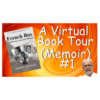We writers can spend a long time writing and polishing our memoirs, but when it comes time to promoting our magnum opus, we fail to invest enough energy to bring that same book to the attention of the public that might want to buy—and—read the memoir we have labored to bring into the world. Marketing a memoir is key here.
I know one man who has written twenty books‚ but does not promote them. None of them are reaching much of an audience.
He loves to write books and loves to think of himself as a published writer—with 20 books no less—but I don’t think he is being read.
On the other hand, I want people to read what I have written. I want to earn income from my work. That is why I believe in marketing a memoir until it reaches its intended audience. Without a readership, I do not feel satisfied as a writer. I am, after all, in a conversation with a reader.
The articles below give you many ideas for marketing a memoir It has long been my belief that the public reading is an effective means of doing so. It is likely that your memoir’s prime audience is local (hometown, state, region) or group specific (retired ministers, parents of a suicide, travel photography). These audiences are well reached through a reading at one of their venues—physical or virtual.
But there are many other ways of marketing a memoir. These include guest blogging, interview articles, Facebook and Twitter outreach, and paid advertising among others.
I hope the posts below will stimulate you to organize your efforts of marketing a memoir.

Sit in on this Virtual Memoir Tour
Today, I am urging you to sit back and enjoy this virtual memoir tour in which I read an excerpt read from my memoir French Boy/A 1950s Franco-American Childhood. Here’s some necessary background: I did not learn English until I went to grade school. My brother had preceded me in school where he had learned […]

This is how to market a memoir!
You’ve written your memoir, or are perhaps still writing. The art and craft of writing a memoir are foremost in the creation stage but there will come another stage afterwards that is to commit to market a memoir you have written.
I will share a process of reaching as large an audience as possible for the book you have worked so hard on. It’s not too early to be thinking of marketing.
I will mentor you on this very subject by sharing my process for my most recent memoir French Boy /A 1950s Franco-American Childhood. Since this is an independently published book, it is my responsibility to identify and then reach out to my potential audience. This is the audience that in some way can be said to have been waiting for my memoir—or your memoir.
Where is my audience—and yours, of course—to be found? What do they read, where do they post, where do they congregate?
[Free Membership required to read more. See below. ]
We'd love to have you access this content. It's in our members-only area, but you're in luck: becoming a member is easy and it's free.
Already a Member?
Not a Member Yet?

Surviving Childhood Abuse: a Neglected Child – Part 3
In this third interview, Denise Brown continues to share her experience of writing Transcending Darkness: A Memoir of Abuse and Grace. This is a startling tale of a neglected child —of an entirely neglected family. To read Part 1, click here. For Part 2, click here. —DL
DL: How do you recommend people deal with sensitive material that relatives might take offense at?
DB: Believe it or not, I still have not told my parents that I wrote a memoir. Having been a neglected child, I have very limited communication with them and have not felt the need to bring it up to them. I’m not worried about them stumbling upon it. They are late in life, and my father doesn’t read anyway.
However, two years before publication, I sent a copy to all of my sisters, each of whom had also been a neglected child and who are written about at length. I asked them to read it and to give me comments on what they thought and to make sure that I didn’t have any of the events in our lives misinterpreted or misremembered. All of them were very supportive and they had some very helpful comments. I changed everyone’s names in the book except for my own.
Each of us who publishes a memoir has to figure out what is appropriate for each family member. It is very dependent on each person’s circumstances. My one piece of advice is to tell the truth in your memoir, not a bitter truth but the hard truth. That is where a sympathetic family member comes in so that they can let you know if it is your hurt and anger about being a neglected child speaking or if your story is an accurate depiction of the events. Don’t outright call someone bad, describe the actions that made them so and let the reader decide.
DL: Did you envision yourself as a writer before you begin this book? What is your identity as a writer now?
[Free Membership required to read more. See below. ]We'd love to have you access this content. It's in our members-only area, but you're in luck: becoming a member is easy and it's free.
Already a Member?
Not a Member Yet?

Surviving Childhood Abuse: Overcoming Trauma- Part 2
We continue our interview with Denise Brown about writing and publishing her book, Transcending Darkness: A Memoir of Abuse and Grace. Hers is a heroic story of overcoming trauma. To read part 1, click here. To read Part 3, click here. —DL
DL: You must have had periods of time in which you were discouraged or, at least, less enthusiastic. Can you tell us about how you kept yourself going? What worked for you?
DB: When I ran into times when I was frazzled by other things going on in my life and didn’t feel the energy to work on my memoir and deal once again with overcoming trauma, I reverted to my minimum goal of one hour per week. I made myself stick to that even if it was 20 minutes over three separate days to keep even the smallest amount of momentum going. Metaphorically speaking, I wasn’t running a marathon; I was hiking the Appalachian Trail and some months were very slow, but I always stuck to my bare minimum goal.
[Free Membership required to read more. See below. ]We'd love to have you access this content. It's in our members-only area, but you're in luck: becoming a member is easy and it's free.
Already a Member?
Not a Member Yet?

Surviving Childhood Abuse: A Writer’s Experience
Congratulations to Denise Brown on the publication of her book, Transcending Darkness: A Memoir of Abuse and Grace. I recently had the opportunity to interview Denise about her experience writing her book on surviving childhood abuse. I am pleased to share her experience. To read Part 2, click here. To read Part 3, click here.—DL
Denis Ledoux: Can you tell our readers what your book is about and why you were impelled to write it? What was driving you to spend the time, energy and money to get this book out into the world?
Denise Brown: Transcending Darkness is a memoir about the abuse that I experienced during my childhood. Abuse led me on a path of self-destruction. This path encountered God and his mercy in unexpected ways. It sounds like a crazy story, but I began writing my memoir when I was in college after having an incredible dream. An angel brought me to visit three teenage girls who were suffering emotionally. Each of them had been reading a book and were crying. I realized that the book was giving them a glimmer of hope for their futures. Then the angel revealed to me that it was my book that I had not yet written that they were reading, and that I was being given the choice of helping them or not. After that, I couldn’t get the dream out of my head! I began writing what would become Transcending Darkness a few days later.
DL: Can you tell us how long it took from the time you conceived the book to the time you had it published? How many years did you spend in active writing? Were there long breaks in between active writing periods? If so, what happened to get you writing again? Writing about surviving childhood abuse must have been difficult. emotionally
[Free Membership required to read more. See below. ]We'd love to have you access this content. It's in our members-only area, but you're in luck: becoming a member is easy and it's free.
Already a Member?
Not a Member Yet?

How I Launched Myself Publicly in the Creative Life: I Publish a Book
Editor: This post on how I Iearned to support myself in the creative life by deciding to publish a book first appeared in February 2014 at a time when covid as not part of our lives. It advocates marketing that I undertook in pre-covid days but which I believe will soon be available and viable again.
I believe that implicit in every publication is access to an audience. Whether you hope to support yourself or to merely attract a more substantial audience, this post—written about a time half a life ago—has something for you.
—
“Is it possible to find readers who will support me in the creative life?” I wanted to know.
One day on 1988, I stood in front of a door, on the other side of which was a group of Foster Grandparents. I had in hand a copy of my book of autobiographical short stories, What Became of Them and Other Stories from Franco-America, which my wife Martha Blowen and I had published through my brand-new imprint, Soleil Press. Soleil means sun in French and Martha who was a paper maker called her studio Moon Papers. So Soleil Press and Moon Papers seemed to us a great combo for a couple (hovering on both sides of 40) who were seeking to live a creative life. [Free Membership required to read more. See below. ]
We'd love to have you access this content. It's in our members-only area, but you're in luck: becoming a member is easy and it's free.
Already a Member?
Not a Member Yet?

5 Fundamental Steps of Online Memoir Promotion
Promoting books online is one of the most stressful tasks for authors. At its core, it’s about informing people why they should buy your book, and giving them an easy way to do so. When put that way, online memoir promotion doesn’t sound so scary. As with anything else, the complexity is in the details. If you ever find yourself feeling overwhelmed by all there is to do, take a breath and focus on the following fundamental steps of advertising a book online.
1. Determine where your audience resides online.
[Free Membership required to read more. See below. ]1. Determine where your audience resides online.
[Free Membership required to read more. See below. ]We'd love to have you access this content. It's in our members-only area, but you're in luck: becoming a member is easy and it's free.
Already a Member?
Not a Member Yet?

Overwhelmed by Book Marketing During a Pandemic? Use These Tips to Connect with Your Target Audience During Uncertain Times
Book marketing during a pandemic can be challenging for memoirists. These six tips will help you target your audience so you can connect with them better.

Sell Your Memoir to Your Intended Audience: 4 Tips
An important step to sell your memoir is to identify your intended audience early in the process. Your buying audience will affect what you include in your memoir and the manner in which you write it. You will likely include different material in your memoir depending on who you believe will purchase it.
[Free Membership required to read more. See below. ]